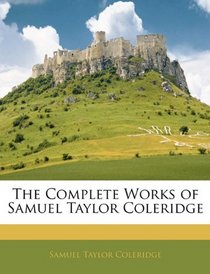Search -
The Complete Works of Samuel Taylor Coleridge
The Complete Works of Samuel Taylor Coleridge
Author:
Purchase of this book includes free trial access to www.million-books.com where you can read more than a million books for free. This is an OCR edition with typos. Excerpt from book: not as of little faith, but because, believing it to be, it is natural we should expect to find traces of it, and as a noble way of employing and developing, and... more »
Author:
Purchase of this book includes free trial access to www.million-books.com where you can read more than a million books for free. This is an OCR edition with typos. Excerpt from book: not as of little faith, but because, believing it to be, it is natural we should expect to find traces of it, and as a noble way of employing and developing, and... more »
ISBN-13: 9781143593802
ISBN-10: 1143593804
Publication Date: 2/4/2010
Pages: 620
Rating: ?
ISBN-10: 1143593804
Publication Date: 2/4/2010
Pages: 620
Rating: ?
0 stars, based on 0 rating




